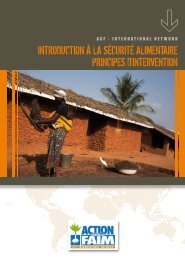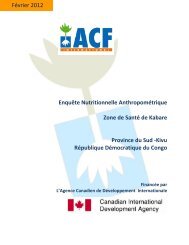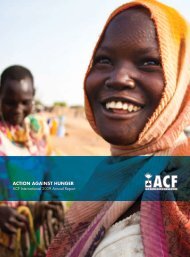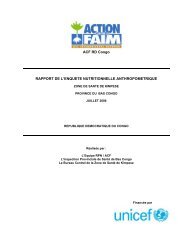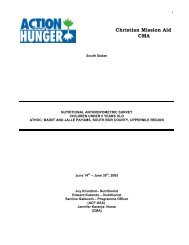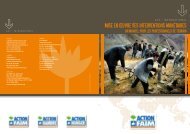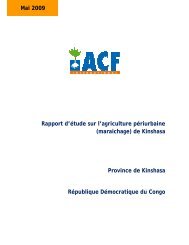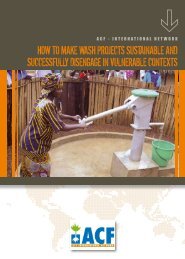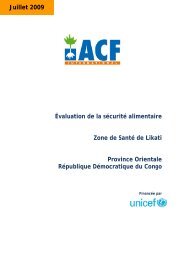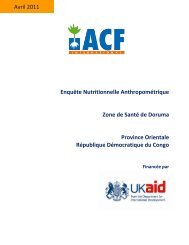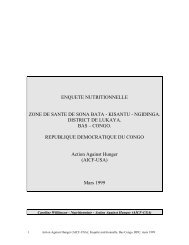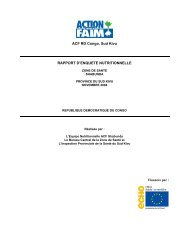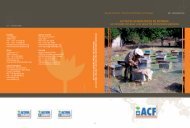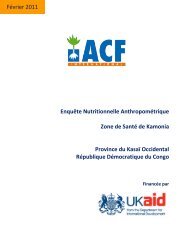Participatory Evaluation of our 2008 - Action Against Hunger
Participatory Evaluation of our 2008 - Action Against Hunger
Participatory Evaluation of our 2008 - Action Against Hunger
You also want an ePaper? Increase the reach of your titles
YUMPU automatically turns print PDFs into web optimized ePapers that Google loves.
Figure 8. Planting practices <strong>of</strong> programme participants and control group<br />
Practice ACF FFS Participant (%) Control Group (%)<br />
Row planting 92 67<br />
Proper spacing 92 8<br />
S<strong>our</strong>ce: FAO evaluation data<br />
3.1.5 Documentation capacity enhanced at group and individual levels<br />
Literacy is a key issue in relation to documentation capacity, as is the distinction between group<br />
and individual level practices. All <strong>of</strong> the groups were requested to bring their full set <strong>of</strong> FFS<br />
documentation to the focus group but only half complied, so not all records could be reviewed<br />
during the fieldwork. Of the group documents reviewed during the evaluation (usually cash<br />
contributions, meeting attendance and minutes, constitutions, member lists, and visitor books), all<br />
were organised, clearly written, and in good physical condition. In most cases, the meeting and<br />
cash records were still being maintained by the group, even though the FFS programme concluded<br />
eight months ago (although perhaps only half <strong>of</strong> the individuals directly asked knew the current<br />
balance <strong>of</strong> their group’s bank account). The continued prevalence <strong>of</strong> cash flow record keeping<br />
nonetheless makes sense when considering how clear financial records can help maintain group<br />
cohesion by increasing transparency and reducing suspicion. These are not concerns for an<br />
individual farmer at household level, however, and probably explain in part the very low quality <strong>of</strong><br />
individual records reported by FAO (factoring too for literacy).<br />
According to the FAO data summarised in Figure 9 below, an approximately equal percentage <strong>of</strong><br />
ACF FFS group members maintain household level records compared with the national FFS<br />
average. Two prominent differences are however apparent from the data. The first is that despite<br />
the inherently equal incidence <strong>of</strong> record keeping, the quality <strong>of</strong> ACF FFS participant records<br />
appears below the national averages. More significant, perhaps, is that record keeping appears to<br />
be far less common for non-participants in the ACF areas than for the national average reported by<br />
FAO. If record keeping is so uncommon in the ACF areas, then even the reported 94 percent <strong>of</strong><br />
ACF participant records determined ‘partial/incomplete’ might nonetheless suggest a programme<br />
accomplishment. In the control group, for example, only 5 percent <strong>of</strong> households keep records.<br />
Participant records may have been equally absent prior to the FFS programme, and partial records<br />
are an improvement over no records. In fact, the ACF sample reports that the main reason given<br />
by participants for lack <strong>of</strong> records or poor quality was that they were ‘too complicated’; most nonparticipants<br />
by comparison responded that they were ‘not trained’ in record keeping or that there is<br />
‘no need’ (the possible responses did not, however, include ‘not literate’ or ‘unable’).<br />
Figure 9. Comparison <strong>of</strong> household record keeping and quality<br />
ACF (%) FAO (%)<br />
Participants Control Participants Control<br />
Proportion <strong>of</strong> HHs that keep records 72 5 70 31<br />
Scanty 6 * 41 58<br />
Quality <strong>of</strong> those<br />
Partial/incomplete 94 * 38 33<br />
records<br />
Comprehensive 0 * 21 9<br />
*Incomplete data<br />
S<strong>our</strong>ce: FAO (<strong>2008</strong>) Table 20, pg 23<br />
Despite the generally good quality <strong>of</strong> FFS group records discussed above, this conclusion is limited<br />
to the more straightforward documents like cash flows and meetings. Only one group was able to<br />
show the team their pr<strong>of</strong>itability analysis from last year, for example, or to produce their business<br />
plan, sub-county registration certificate, programme budget, or in some cases even the specific<br />
amount <strong>of</strong> seed they planted and harvested. This surely influences the transparency <strong>of</strong> group<br />
documentation, which in turn is likely to contribute to less household level adoption as well.<br />
3.2 Increased Domestic Production<br />
Alongside improved practices throughout the production cycle is the guiding intent that these<br />
contribute directly to increased yields and, by extension, pr<strong>of</strong>its and stores. Households are by no<br />
<strong>Action</strong> <strong>Against</strong> <strong>Hunger</strong> Uganda - 25 - Farmer Field School <strong>Evaluation</strong>



